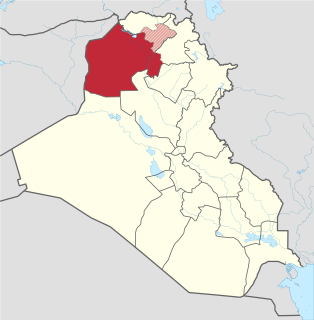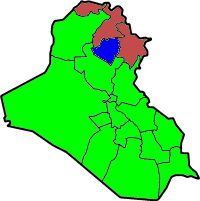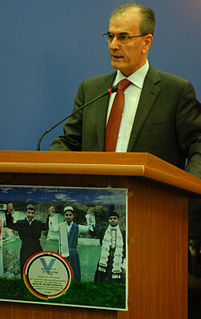This article needs additional citations for verification .(August 2007) (Learn how and when to remove this template message) |
The Kirkuk Provincial Council is the provincial council of the Kirkuk Governorate, based in Kirkuk, Iraq.
This article needs additional citations for verification .(August 2007) (Learn how and when to remove this template message) |
The Kirkuk Provincial Council is the provincial council of the Kirkuk Governorate, based in Kirkuk, Iraq.
Its inaugural session was dedicated to having the introduction of its new members then followed by the oath ceremony that was supervised by Judge Thahir Hamza Salman, the head of Kirkuk Appellate Court.
KPC has emphasized promoting the brotherhood spirits and establishing the principles of equality and common work in order to provide services to citizens of the province impartially, in spite of the conspiracies and intimidations of the terrorists, the unbelievers and agents who are the enemies of our people and who attempt in vain to spoil the democratic change process in building the state of law and civil society, and who try to provoke the sectarianism and to create sedition among diverse communities in Kirkuk province.
Because of the common goals in the electoral agendas of the different electoral lists, KPC has prioritized a list of aims to be accomplished: reconstruction, secure the settlement, promoting the rule of law, improve the works of the government departments and institutions, providing equal job opportunities, improving the living of the citizens and developing the basic services in education, health and other fields.
In November 2006, Arab and Turkomen members of the council withdrew, claiming that the Kurdish majority, which holds 26 of the 41 seats on the council, had excluded them from decision-making and governance. Arab members returned to the council in December 2007 after a new power-sharing deal was agreed. [1]
The council has formed a number of committees.
The principle of consensus, which was adopted by the Iraqi National Assembly in forming its committees and in forming the Iraqi Transitional Government, has been adopted by KPC in forming its committees. One of the committees is Article 58 and the Victims of Ethnic Cleansing Policies Committee to follow up the procedures of normalizing the situation in Kirkuk Province according to the new Iraqi Constitution.
When in early 2013, a survey conducted by Iraqi women's organization Pana and Iraqi-German NGO WADI revealed a still high prevalence of female genital mutilation of 38% in Kirkuk province, the provincial council's Human rights committee disputed the data, decrying a loss of reputation. [2]
| Member | Block | Membership Turns | Political Affiliation | Position |
|---|---|---|---|---|
| Rizgar Ali HamaJan | KBL | 2 | Patriotic Union of Kurdistan (PUK) | Chairman of Kirkuk Provincial Council |
| Rebwar Fayq Talabani | KBL | 1 | Kurdistan Islamic Union | Deputy Chairman of KPC |
| Mohamed Kamal | KBL | 2 | Kurdistan Democratic Party of Iraq (KDP) | Security Committee |
| Ahmed Abdullah Askari | KBL | 2 | PUK | Projects, Reconstruction & Public Services Committee |
| Awad Mohamed Ameen | KBL | 1 | Kurdistan Toilers' Party | Public Affairs Committee |
| Dilshad Pirot Aziz | KBL | 1 | Independent | Projects, Reconstruction & Public Services Committee |
| Babakir Sidiq Ahmed | KBL | 1 | PUK | Article 58 & The Victims Of Policies & Processes Of Ethnic Cleansing Committee |
| Galawezh Abdul-Jabbar Jabbari | KBL | 1 | PUK | Security & Public Safety Committee |
| Azad Sabir Jabbari | KBL | 1 | PUK | Agriculture & Irrigation Committee |
| Layla Hassan Shukur | KBL | 1 | PUK | |
| Perween Mohamed Ameen | KBL | 1 | KDP | Education & Higher Education Committee |
| Mahmoud Mohamed | KBL | 1 | KDP | Legal, Election & Referendum Committee |
| Ali Namiq Salihi | KBL | 2 | Independent | Oil & Mineral Resources Committee |
| Ibraheem Khalil Rasheed | KBL | 1 | Kurdistan Islamic Union | Economy & Finance Committee |
| Silvana Boya Nasir | KBL | 1 | Assyrian Patriotic Party | Social & Religious Affairs Committee Economy & Finance Committee |
| Sherzad Adil Khursheed | KBL | 2 | KDP | Article 58 & The Victims Of Policies & Processes Of Ethnic Cleansing Committee Agriculture & Irrigation Committee |
| Almas Fadhil Kamal | KBL | 1 | PUK | Social & Religious Affairs Committee Legal, Election & Referendum Committee |
| Riyadh Danuk | KBL | 1 | Independent | Economy & Finance Committee |
| Jamal Mawlud Bapir | KBL | 1 | Kurdistan Communist Party | Projects, Reconstruction & Public Services Committee Oil & Mineral Resources Committee |
| Ali Mahmud Mohamed | KBL | 1 | Kurdistan Communist Party | Agriculture & Irrigation Committee |
| Jwan Hassan Zangana | KBL | 1 | Kurdistan Islamic Union (KIU) | Hiring & DeBaathification Committee Article 58 & The Victims Of Policies & Processes Of Ethnic Cleansing Committee |
| Layla Mohamed Khidhir | KBL | 1 | Kurdistan Communist Party | Education & Higher Education Committee |
| Irfan Jamal Kirkukli | KBL | 2 | Turkmen People's Party | Security & Public Safety Committee |
| Sahira Seyfudeen Nuri | KBL | 1 | Iraqi Turkmen Union Party | Hiring & DeBaathification Committee Legal, Election & Referendum Committee |
| Jwad Jasim Al-Janabi | KBL | 1 | Independent | Social & Religious Affairs Committee Education & Higher Education Committee |
| Nasreen Khalid Whab | KBL | 1 | KDP | Hiring & DeBaathification Committee Public Affairs Committee |

Kirkuk is a city in Iraq, serving as the capital of the Kirkuk Governorate, located 238 kilometres north of Baghdad. Kirkuk lies in a wide zone with an enormously diverse population and has been multilingual for centuries. There were dramatic demographic changes during Kirkuk's urbanization in the twentieth century, which saw the development of distinct ethnic communities. Iraqi Turkmens, Kurds, Arabs, and Assyrians lay conflicting claims to this zone, and all have their historical accounts and memories to buttress their claims.

Kirkuk Governorate or Kirkuk Province is a governorate in northern Iraq. The governorate has an area of 9,679 square kilometres (3,737 sq mi). In 2017 the estimated population was 1,259,561 people. The provincial capital is the city of Kirkuk. It is divided into four districts.

Nineveh Governorate is a governorate in northern Iraq that contains the ancient Assyrian city of Nineveh. It was an integral part of Assyria from the 25th century BC to the 7th century AD. It has an area of 37,323 km2 (14,410 sq mi) and an estimated population of 2,453,000 people in 2003. Its chief city and provincial capital is Mosul, which lies across the Tigris river from the ruins of ancient Nineveh. Tal Afar is the second-biggest city. Before 1976, it was called Mosul Province and included the present-day Dohuk Governorate, which is now part of the autonomous Kurdistan Region.

The Anfal genocide was a genocide that killed between 50,000 and 182,000 Kurds as well as several thousand Assyrians. It was committed during the Al-Anfal campaign led by Ali Hassan al-Majid, on the orders of President Saddam Hussein, against Iraqi Kurdistan in northern Iraq during the final stages of the Iran–Iraq War.

The Council of Representatives is the unicameral legislature of the Republic of Iraq. As of 2020, it comprises 329 seats and meets in Baghdad inside the Green Zone.

The Iraqi Turkmen Front is a political movement founded in 1995 which seeks to represent the Iraqi Turkmen people. Since the fall of Saddam Hussein in 2003, the ITF has contested control of Kirkuk and other areas of northern Iraq, claiming that Kirkuk belongs to the Turkmen people.
The Constitution of the Republic of Iraq is the fundamental law of Iraq. The first constitution came into force in 1925. The current constitution was drafted and approved in 2005.
Kurdish women have traditionally played important roles in Kurdish society and politics. In general, Kurdish women's rights and equality have improved dramatically in the 21st century due to progressive movements within Kurdish society. However, despite the progress, Kurdish and international women's rights organizations still report problems related to gender inequality, forced marriages, honor killings, and, in Iraqi Kurdistan, female genital mutilation (FGM).

The Iraqi Turkmen, also referred to as Iraqi Turks, are Iraqis of Turkic origin who mostly adhere to a Turkish heritage and identity. Most Iraqi Turkmen are the descendants of the Ottoman soldiers, traders and civil servants who were brought into Iraq from Anatolia during the rule of the Ottoman Empire. Despite the popular reference to the Turks of Iraq as "Turkmen", they are not directly related to the Turkmen people of Turkmenistan and do not identify as such.

The Kirkuk status referendum was the Kirkuk part of a planned plebiscite to decide whether the disputed territories of Northern Iraq should become part of the Kurdistan Region. The referendum was initially planned for 15 November 2007, but was repeatedly delayed and ultimately never took place.

Governorate or provincial elections were held in Iraq on 31 January 2009, to replace the local councils in fourteen of the eighteen governorates of Iraq that were elected in the 2005 Iraqi governorate elections. 14,431 candidates, including 3,912 women, contested 440 seats. The candidates came from over 400 parties, 75% of which were newly formed.

The al-Hadba party is a political party formed to contest the 2009 Iraqi governorate elections in Ninawa province. It is mostly made up of Sunni Arabs. Its leading member Atheel al-Nujaifi is brother of Usama al-Najafi who is part of the Iraqi National List led by former Iraqi Prime Minister, Ayad Allawi. It has also been reported that members of the coalition have the backing of Shiite Prime Minister Nouri al-Maliki.

Governorate or provincial elections are due to be held in Kirkuk Governorate in 2009 to replace the governorate council elected in the 2005 Iraqi governorate elections. The remaining governorates outside Iraqi Kurdistan held elections on 31 January 2009.

The Kurdistan Democratic Party, usually abbreviated as KDP or PDK, is the largest party in Iraqi Kurdistan and the senior partner in the Kurdistan Regional Government. It was founded in 1946 in Mahabad in Iranian Kurdistan. The party claims it exists to combine "democratic values and social justice to form a system whereby everyone in Kurdistan can live on an equal basis with great emphasis given to rights of individuals and freedom of expression."
The status of women in Iraq at the beginning of the 21st century is affected by many factors: wars, sectarian religious conflict, debates concerning Islamic law and Iraq's Constitution, cultural traditions, and modern secularism. Hundreds of thousands of Iraqi women are widowed as a result of a series of wars and internal conflicts. Women's rights organizations struggle against harassment and intimidation, while they work to promote improvements to women's status in the law, in education, the workplace, and many other spheres of Iraqi life, and to curtail abusive traditional practices such as honor killings and forced marriages.

Kurds in Iraq are people born in or residing in Iraq who are of Kurdish origin. The Kurds are the largest ethnic minority in Iraq, comprising between 15% and 20% of the country's population according to the CIA World Factbook. Most of them live in Iraqi Kurdistan.

The Autonomous Administration of North and East Syria (NES), also known as Rojava, is a de facto autonomous region in northeastern Syria. It consists of self-governing sub-regions in the areas of Afrin, Jazira, Euphrates, Raqqa, Tabqa, Manbij and Deir Ez-Zor. The region gained its de facto autonomy in 2012 in the context of the ongoing Rojava conflict and the wider Syrian Civil War, in which its official military force, the Syrian Democratic Forces (SDF), has taken part.

Human rights in Iraqi Kurdistan refer to the human rights issue in the autonomous area of Kurdistan Region.

Najmiddin Karim, born 1949, also known as Najmaldin Karim, is an Iraqi Kurdish politician who was governor of Kirkuk Governorate from 2011 to 2017. Prior to the invasion of Iraq, Karim had served in numerous Kurdish and Iraqi opposition groups.

An independence referendum for Kurdistan Region of Iraq was held on 25 September 2017, with preliminary results showing approximately 93.25 percent of votes cast in favour of independence. Despite reporting that the independence referendum would be non-binding, the autonomous Kurdistan Regional Government (KRG) characterised it as binding, although they claimed that an affirmative result would trigger the start of state building and negotiations with Iraq rather than an immediate declaration of independence of Kurdistan. The referendum's legality was rejected by the federal government of Iraq.